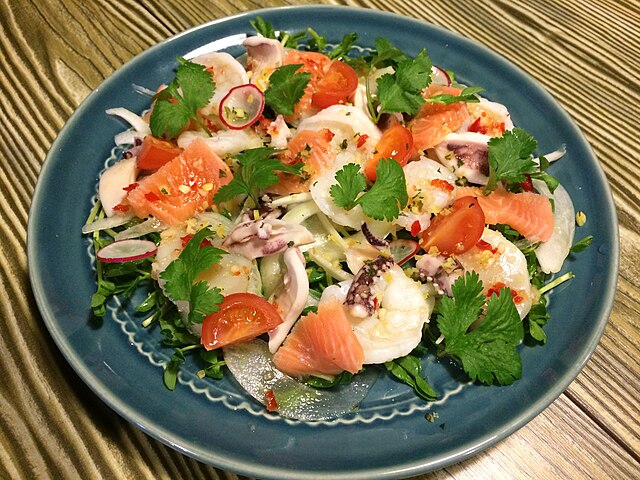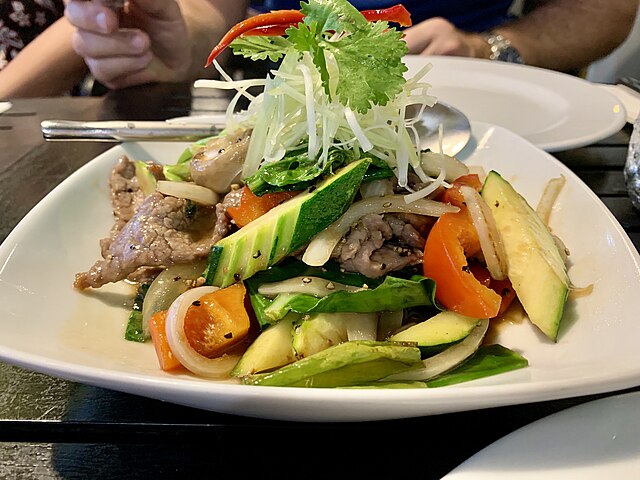Thammasat University students interested in food, business, economics, Thai studies, sociology, sustainability, climate change, and related subjects may find it useful to participate in a free 19 November Zoom talk on The Future of Eating Out: A View from Thailand.
The event, on Thursday, 10 November 2022 at 9am Bangkok time, is presented by the Sophia University Institute of Comparative Culture, Japan.
The TU Library collection includes many books on different aspects of Thai restaurants and the retail food industry.
The speaker will be food researcher Dharath Hoonchamlong.
As the event webpage explains,
Thailand is a center of global gastronomy in Southeast Asia. This edition of the Future of Eating Out webcast takes us to Thailand in a discussion with food scholar and gastronome Dharath Hoonchamlong. We will discuss global and regional trends affecting the restaurant business in Thailand, including COVID. Dharath will discuss how sustainability concerns have changed the hospitality industry before, during and after the pandemic. Related topics include greenwashing, education, climate crisis and its effects. Dharath will share his experiences opening and closing business during the pandemic, including the challenges of introducing sustainability to the bar community in Thailand. These experiences provide insights into social issues in the Thai food world, including inequality in workplace and work conditions, misconducts, ethics, and inclusivity.
Dharath Hoonchamlong is a food scholar who explores and involves himself with all things food and sustainability through multidisciplinary approaches. He holds an MA in Food Studies from New York University. He was the environmental manager at Bo.lan. He also co-founded “wasteland” which is known as Thailand’s first sustainable bar. He works in various areas from waste management, circular economy with farmers and communities, events, product development, connecting people to solve food issues, communications, and sometimes dabbles in food writing.The Future of Eating Out Lecture Series: Buffeted by COVID, climate change, labor shortages, and other stressors, the food and beverage industry around the world is in crisis and transition. How are practices of eating out changing? Where are restaurants, street vendors, and other eateries headed? This is a series of lectures and dialogues with food researchers and practitioners to see where the global business of eating out is headed during and after the COVID crisis. Looking at eateries on different scales from gourmet restaurants to street vendors, we hope to gain insights that can be shared across national and local contexts. This online series is organized by the Global Food Project of the Institute of Comparative Culture at Sophia University and the New York University Nutrition and Food Studies, with funding from Sophia University. Lectures will be held on zoom, recorded and made available to interested viewers around the world.
Students are invited to register for the event at this link:
https://forms.office.com/r/zJjPRbvmYP

Khun Dharath responded to the following questions from one online interviewer:
- Restaurants and bars are often given a bad name in the realm of waste and sustainability. Can you give us some examples of how you work with them to improve this?
- Mindset and understanding are key, as the people who are going to implement sustainable practices have to understand and be able to adopt these thoughts first. Practicality is also important when it comes to waste and sustainability, as the system has to work and be adaptable in everyday operations. Lastly, transparency. Restaurants and bars can preach so much, but they rarely demonstrate transparency as they are afraid it may affect their image. Changes are not going to happen overnight. They take time. We should be aware of how we are doing, our progress, and what we want to achieve.
- How do you think the sustainability movement in the F&B industry in Thailand will develop in the coming years? What are some big trends you are seeing here in Thailand or regionally?
- More places, initiatives, programs, projects, and collectives are popping up all over Thailand. Nature is closer and connection with local roots is stronger. Access to producers, ingredients, culture, and knowledge is more interconnected, and a sense of pride in identity and culture is also on the rise. These have shaped and changed food culture and food business across provinces. Collaborations within Asia are more common now, and I look forward to seeing more of that crossing between regions as well. Additionally, social media has become a platform for people to share and access information and knowledge about food and beverage from history to creativity. There’s more awareness and understanding, which makes the changes to arise in coming years even more exciting…
- Which sustainable hotspots in Thailand should we be knowing about?
- Some of the sustainable hotspots in Thailand that I would like to mention are: The Food Trust Bangkok, situated where Bo.lan used to be. Now a food education space with classes, workshops, and events led by Duangporn Songvisava (Bo) and Dylan Jones. There’s also the grocery section that works directly with local farmers and producers. The Food Trust also has another location in Chiang Mai. Na Project strives for sustainability of the planet and people by using food to create social awareness and social impact by Sakson Rouypirom (Sak) and Diroklarp Janthachotbutr (Him) through a collaborative space and programs. There are programs that help at-risk youth, as well as workshops about sustainability. What I would like to highlight is the ‘Urban Refugee Kitchen,’ where diners can connect with refugee families to learn about food, identity, displaced people, culture, and how the program helps people learn and equip them with skills before relocating to their new home. Studio Horjhama is a place to learn about diversity, food culture, and ingredients within Thailand that are unknown to many. It’s led by Sasithon Kamrit (Ann), who has been up countless mountains and has met with many communities, especially indigenous ones. Sasithon is very knowledgeable, vocal about food and environment, and also makes amazing and very comforting food. Maadae Slow Fish Kitchen is a tiny seafood-centric spot in Chiang Mai with strong ties to Slow Food spearheaded by Yaowadee Chookong (Yao) and Saruda Sooksaeng (Nuch). They don’t only work with fisher communities in the south of Thailand, but also communities in the mountains in the north too. It’s one of my go-to spots whenever I’m in Chiang Mai, and I always learn something new about fisheries there.
- Lastly, as avid diners and drinkers, leave us with a word of advice. How can we be more eco-conscious consumers when we go out?
- It’s always a dilemma not knowing whether the places we visit are sustainable or not, so we should inquire and learn more about the places we dine and drink at. There are many layers to how food- and beverage-related establishments work with sustainability and the environment. Some main questions to ask yourself are: What is the impact of the people working and dining here? What is the impact on the neighbourhood and the city? And what is the impact on the environment and the earth? Ask yourself: are they and are you making changes and impacts for sustainability?

(All images courtesy of Wikimedia Commons)

